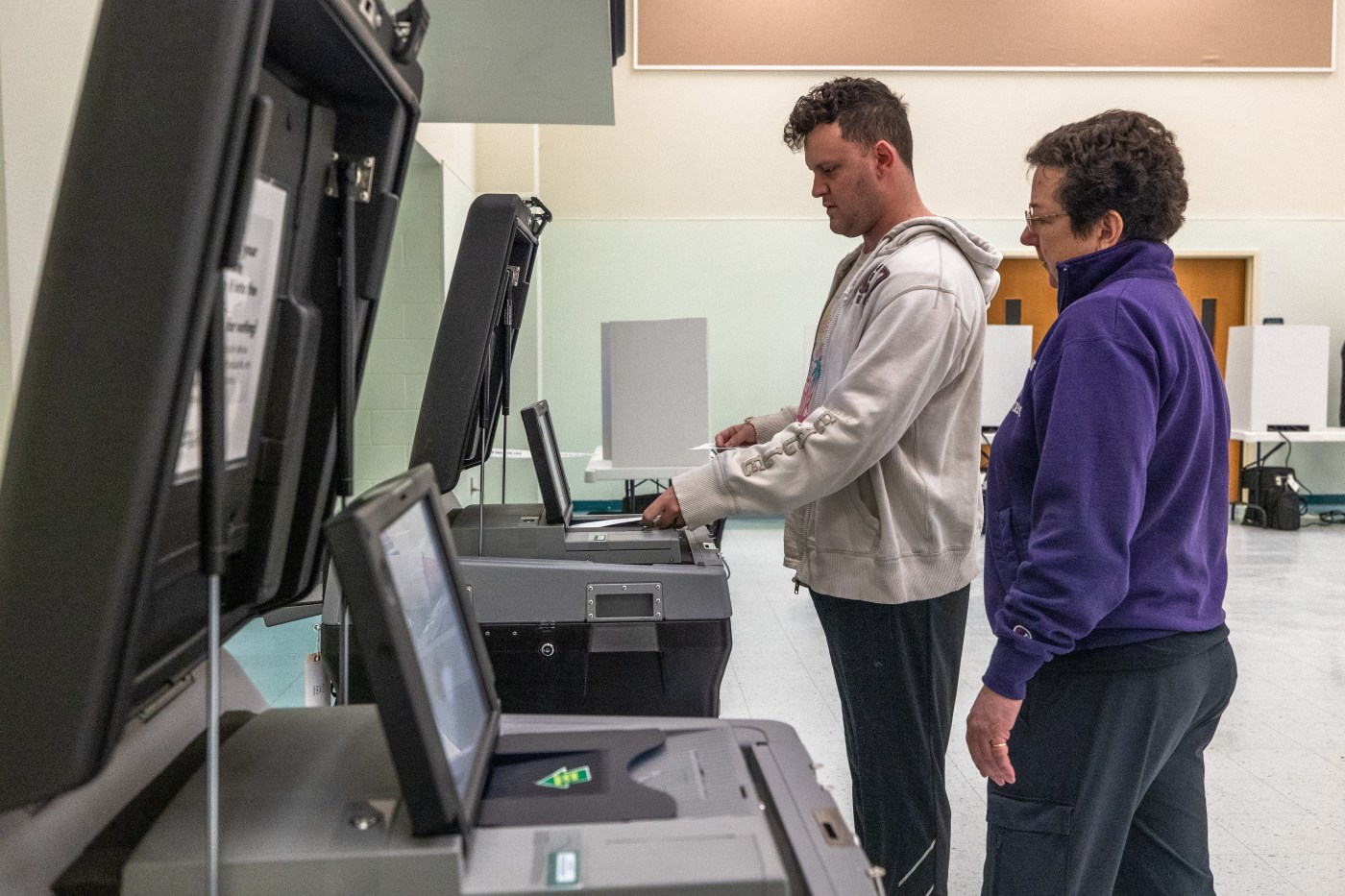
Jamelle Bouie: When politicians invoke the Founding Fathers, remember this
As things stand, 48 states are set to allocate their electors in November according to the winner of the popular vote in their state. Whoever gets the most votes — no matter the margin — gets all the electors.
In the remaining two states, Maine and Nebraska, the process works a little differently. There, electoral votes are partly divvied up on a proportional basis. In Nebraska, two of its five electoral votes are given to the winner of the statewide popular vote, and the other three are given to the victor in each of the state’s three congressional districts. In Maine, two of the state’s four electoral votes go to the winner of the popular vote, and the other two are split between its two congressional districts.
In the 2020 presidential election, for only the second time since it adopted this system in 1991, Nebraska split its electoral votes between the two candidates on the ballot. Donald Trump won the state and its 1st and 3rd congressional districts, while Joe Biden won the 2nd Congressional District, representing parts of Omaha and surrounding areas.
Biden won that election with 306 electoral votes; the Nebraska elector did not make a difference. But in an exceedingly close election — say, an election between an unpopular incumbent and an equally unpopular challenger (himself a former incumbent) — it could. Which is why Nebraska Republicans have begun an effort, backed by Trump, to end its quasi-proportional allocation of electoral votes.
Nebraska Republicans seem to know that this move is a vigorous exercise in partisan venality, which is why they’ve tried to defend it with a time-honored appeal to the Founding Fathers. “It would bring Nebraska in line with 48 of our fellow states, better reflect the founders’ intent and ensure our state speaks with one unified voice in presidential elections,” Gov. Jim Pillen, a Republican, wrote in a statement. (Trump called it “a very smart letter.”)
It is well within the rights of the Nebraska Legislature to adopt the winner-take-all system that most other states use to allocate electors. But I am less interested in the substance of the change than I am in the justification for the decision. That is the common, even ubiquitous, idea that the current form of the Electoral College represents the original intent of the drafters and ratifiers of the Constitution. The problem is simple: It’s not true.
Any attempt to impute an original intent to the framers’ construction of the Electoral College runs into the basic problem that it was, even compared with everything else in the Constitution, a last-minute and hastily constructed compromise meant to get around a large set of almost intractable differences.
Delegates to the Philadelphia Convention in 1787 were consumed with argument over the method and mode of presidential selection. In the first vote taken on the issue, early in the convention, most delegates favored legislative selection. But several of the most influential delegates, among them James Madison of Virginia, thought that this threatened the separation of powers, and thus the basic structure of the new government.
Madison observed in his notes that it was “a fundamental principle of free government that the legislative, executive, and judiciary powers should be separately … and independently exercised.” As such, it was “essential, then, that the appointment of the executive should either be drawn from some source or held by some tenure that will give him a free agency with regard to the legislature.”
Madison and his like-minded allies — Pennsylvanians James Wilson and Gouverneur Morris, for example — favored a national popular vote to choose the president. Direct election by “the people” (for the most part, property-owning white men) would guarantee executive independence and filter for men of “distinguished character, or services.” On the other side were Southern delegates who thought a popular vote would put them on the losing side of presidential contests; the free population of the North was, of course, larger than the free population of the South. Still other delegates wanted the legislative option to prevail.
In “Why Do We Still Have the Electoral College?” historian Alexander Keyssar writes that more than a few other ideas bubbled up over the course of that summer. Among them: “selection by the governors of the states or by state legislatures; election by a committee of 15 legislators chosen by lot (and obliged to act as soon as they were chosen, to avoid intrigue); a popular election in which each voter cast ballots for two or three candidates, only one of whom could be from his own state: nomination of one candidate by the people of each state, with the winner to then be chosen by the national legislature.”
As the convention came to a close, the exhausted delegates finally made a choice: Someone else would have to choose. They turned the issue over to a committee on “postponed parts.” That committee, in turn, tried to chart a path of least resistance through the options at hand. First, it adopted an idea — introduced during the summer of discussion — to have electors act as intermediaries between the public and the selection of the president. In a concession to supporters of legislative selection, those electors would gather in a purpose-made body to make their decision. In a nod to the concerns of Southern delegates, the distribution of electors would be based on representation in the House and Senate.
The committee made its recommendation, and with one major modification — the House of Representatives, not the Senate, would decide in the event that no candidate earned a majority — the convention accepted it. The delegates had no real sense of how the Electoral College would work in practice. More than a few thought that most elections would be decided by the House. And in any case, they also knew that however the people chose a president, their first choice would be George Washington. To both the framers and the ratifiers, the mechanism was less important than the man.
In the first presidential elections of the American republic, the Electoral College worked mostly as designed. Some states held popular elections to choose electors; others had them selected by state legislatures. Electors cast their ballots for the man who would be president, Washington, and designated a candidate for vice president as well, John Adams (an effort that required some coordination since, until the ratification of the 12th Amendment, electors could not cast separate ballots for president and vice president). But with the full emergence of partisan politics during Washington’s second term, and his departure at its conclusion, state legislatures, essentially acting as partisan political organizations, tried to game the system.
“States,” Keyssar notes, “took advantage of the flexible constitutional architecture to switch procedures from one election to the next.” They would move from legislative selection of electors to a district-based vote to a winner-take-all election (called the general ticket) depending on which option was more likely to secure victory for the legislature’s favored candidate. Virginia, for example, switched from district elections to winner-take-all in 1800 to help Thomas Jefferson win the presidency.
As formal political parties took shape — and center stage — in American politics, more and more state legislatures adopted winner-take-all allocation of electors, in addition to taking steps to ensure that electors would not be independent of the party that chose them. By the time of Jefferson’s battle for reelection in 1804, the framers’ Electoral College — a deliberative body that would filter candidates for selection by the House — was a dead letter. In its place was an effectively new system tailored to partisan reality.
As Keyssar writes, “Candidates for president and vice president were put forward by political parties, centered in Congress; the parties also coordinated the election campaigns. Nearly everywhere the strategic goal of these campaigns was to win legislative or popular majorities within entire states — since all but four (out of 17) delivered their full complement of electoral votes to one candidate. Those votes were physically cast by electors who gathered in state capitals and served simply as messengers: they did not deliberate, discuss or ‘think.’”
The Electoral College as we know it is less a product of the insight or design of the framers and more a contingent adaptation to the political world that emerged out of the first decade of the American republic. That world would change again, in the 1820s and ’30s, with the rise of Andrew Jackson, universal white male suffrage and the mass political party. The electoral system would adjust; by 1837, not willing to lose any partisan advantage, every state (save South Carolina) would adopt winner-take-all allocation of electors by popular vote. The tally of popular votes took on new significance as well: It stood, for the winner, as a symbol of popular legitimacy, even if it didn’t contribute to the outcome of the election.
There is nothing in the Constitution that says Nebraska Republicans can’t change the way the state allocates its electoral voters. At most, if they made the change, Nebraska Republicans would be violating the informal rules of American politics, which strongly discourage this abuse of the process. Again, I think Nebraska Republicans know this, which explains their immediate appeal to the supposed intent of the framers. This is something Americans do. We use the framers — or more accurately, we use the myths and folk traditions we’ve developed around the framers — to legitimize our decisions in the present day and to try to delegitimize those of our opponents.
But whether as men or myths, the framers cannot do this. They cannot justify the choices we make while we navigate our world. The beauty, and perhaps the curse, of self-government is that it is, in fact, self-government. Our choices are our own and we must defend them on their own terms. And while it is often good and useful to look to the past for guidance, the past cannot answer our questions or tackle our problems.
Novelty may disturb men’s minds, but we are still obligated to take our circumstances on their own terms, not those of an age long settled into dust.
Jamelle Bouie writes a column for the New York Times.
Related Articles
Other voices: Criminal justice reform is alive. Thank conservatives
Robert Pearl: Why ChatGPT’s ‘memory’ will be a health care game changer
Other voices: Legal marijuana is making roads deadlier
David Brooks: The quiet magic of middle managers
Trudy Rubin: Will Speaker Mike Johnson stand up to Trump and allow House vote on Ukraine aid?

